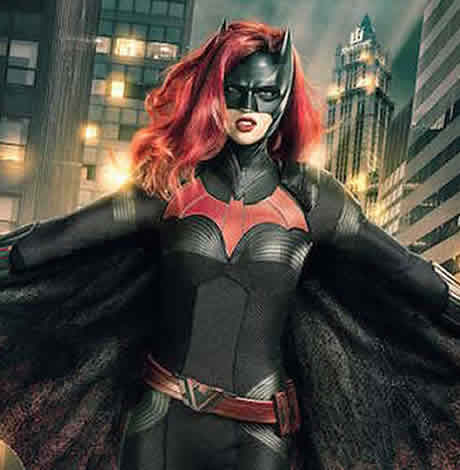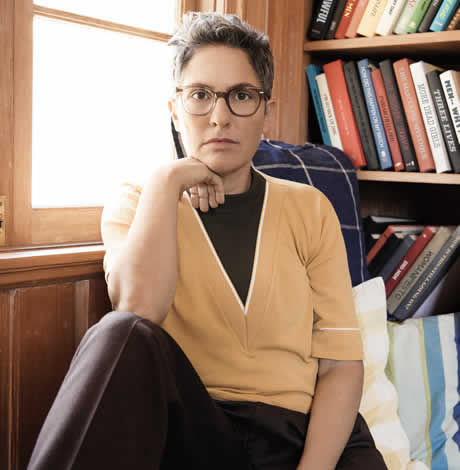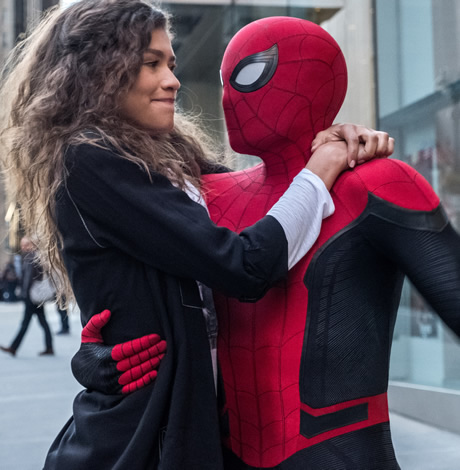Arts & Entertainment
Director Bryan Singer sued for alleged rape of 17-year-old boy
this is the third sexual abuse allegation against the filmmaker
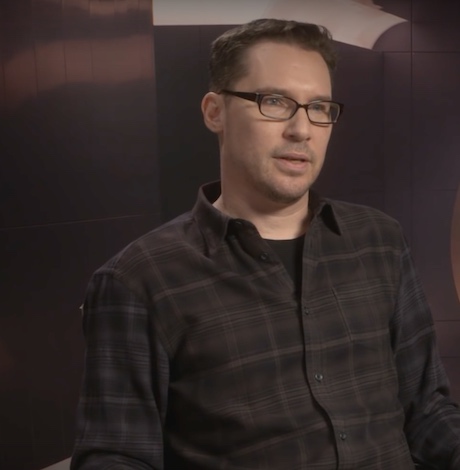
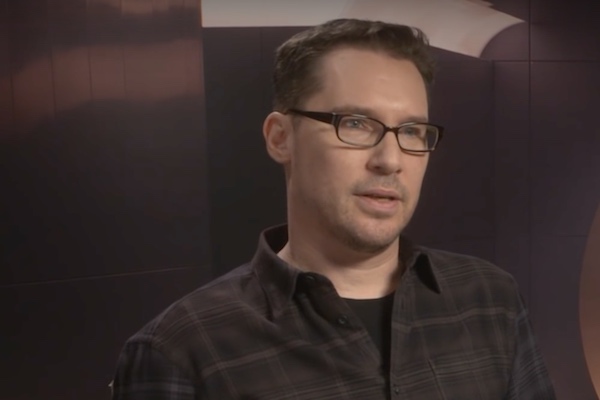
(Screenshot via YouTube.)
Director Bryan Singer has been accused of allegedly raping a 17-year-old boy at a party in 2003.
According to court documents filed in King County, Wash., Cesar Sanchez-Guzman claims he met Singer at a yacht party hosted by Lester Waters, who “was a wealthy tech investor who frequently hosted parties for young gay males in the Seattle area.”
Sanchez-Guzman says while Singer was giving him a tour of the yacht he brought him into the master bedroom and shut the door. The lawsuit alleges Singer “forced Cesar to the floor, shoved Cesar’s face against his crotch area and demanded Cesar perform oral sex on him.”
When Sanchez-Guzman refused, the documents state “Singer forced him into acts of oral and anal sex.”
The lawsuit continues on that Singer threatened to ruin Sanchez-Guzman’s reputation if he told anyone about the incident.
“Later, Bryan Singer approached Cesar and told him that he was a producer in Hollywood and that he could help Cesar get into acting as long as Cesar never said anything about the incident,” the court documents read. “He then told Cesar that no one would believe him if he ever reported the incident, and that he could hire people who are capable of ruining someone’s reputation.”
Sanchez-Guzman says the alleged incident has caused him “to experience severe psychological, mental and emotional injuries, shame, humiliation and loss of enjoyment of life.”
In a statement to People, Singer’s rep denied the claims.
“Bryan categorically denies these allegations and will vehemently defend this lawsuit to the very end. Cesar Sanchez-Guzman apparently claims that he did not remember this alleged incident from 2003 until now. Significantly, when Sanchez-Guzman filed for bankruptcy only a few years ago, he failed to disclose this alleged claim when he was supposed to identify all of his assets, but conveniently, now that the bankruptcy court discharged all of his debts, he is able to recall the alleged events,” the statement reads.
This isn’t the first time Singer has faced sexual misconduct allegations. In 2014, Michael Egan III filed a civil suit against Singer alleging the director forced him to have sex at parties in Encino and Hawaii while he was a teenager in the late ’90s. Egan later dropped the lawsuit.
Later that year, another man filed a sexual abuse lawsuit against Singer and entertainment executive Gary Goddard. The lawsuit claims Singer fondled him and tried to have sex with him. It also alleges Goodard participated in nude webcam sessions with him when he was 15 and had sex with him when was 16.
Both Singer and Goddard denied the allegations.
In addition to his legal troubles, Singer was recently fired from directing Queen biopic, “Bohemian Rhapsody” with rumors swirling his on-set absences and altercations with cast members Rami Malek and Tom Holland contributed to his departure. Dexter Fletcher has been named the film’s new director.
In light of the recent allegation, students at the USC School of Cinematic Arts have started a petition requesting that the school remove Singer’s name from the Division of Cinema and Media Studies.
“It is completely unacceptable that this prestigious department within our school still carries the name of Bryan Singer, a man accused multiple times of sexual harassment, assault, and pedophilia, the petition, which has almost received its 5,000 signature goal, reads.
Arts & Entertainment
How queer Baltimore artists are building strong community spaces
Fruit Camp is home to tattoo artists, musicians, herbalist, and more

Fruit Camp, a tattoo and art studio in the Remington neighborhood of Baltimore, opened with a bang in February of 2020. “We had a big opening party. It was really fun. Everybody came,” says Geo Mccandlish, one of the co-founders. “It was the last rager I went to,” they said.
The pandemic shut down their shop—alongside the world—for months, but the shop survived. “We just put our stimulus checks into keeping the rent paid,” says Emi Lynn Holler, the other co-founder.
They had built the space without loans, on a low-budget, do-it-yourself ethos with hands-on help from their community. “The deeply punk shoestring budget background worked really to our advantage,” says Mccandlish.
While it wasn’t ideal, it was fitting. Mccandlish and Holler’s artistic partnership has almost always lived at the crossroads of community, DIY, and extraordinary circumstances. A decade ago they met as residents of the Bell Foundry, an arts co-op and co-living space, where sharing knowledge, making community, and living cheaply were key to getting by.
It was there that Holler gifted Mccandlish their first tattooing machine and taught them how to use it. And it was where the two of them—who also do printmaking, fiber arts, and other creative activities—started imagining co-founding a space of their own. That dream felt more urgent in 2016 when Baltimore condemned the Bell Foundry and evicted the residents, including Mccandlish, during a nationwide crackdown on artist co-ops after the Ghost Ship fire in Oakland.
Holler had by then moved to Massachusetts to pursue formal tattoo education and certifications.
“Living inside that level of precarity,” Mccandlish explains, “made us want to figure out a hybrid,” between the unique, collaborative Bell Foundry and a licensed, commercial space. “We wanted to find a way to create more safety,” says Holler.
But they didn’t just want to create safety for the two of them. When looking at spaces, they opted to lease a bigger studio—a two-story, double-row house with room for tattooing on the first floor and small studios on the second. Mccandlish said the prospect of a larger project felt “tantalizing and precious” because they felt “if you have access to something, you try to make sure that every resource that is a part of it is also shared.”
Today, in addition to tattoos, Fruit Camp holds studios for musicians, fiber artists, an herbalist, a massage therapist, and a doula. “We’re able to incubate and hold nontraditional pathways to different kinds of creative practices,” says Mccandlish.
You can consider Fruit Camp a queer business by several definitions. For one, every member of the studio identifies as queer, in some way. It also looks queer. “It’s campy and it’s pink, and we have a lot of gay art hanging around,” explains Mccandlish.
Holler says sometimes they get asked about losing potential patrons by being openly queer, but that isn’t a worry. “I think it only strengthens us,” they say. “It brings people to us who also want to find each other in that world.” They pause, “I feel like it boils down to we keep us safe and we take care of ourselves.”
Mccandlish emphasizes that “queer is the political meaning” and the “orientation to” which they do their work as a community space and business. Their shop practices are explicitly queer and trans-friendly—in addition to being “anti-racist, anti-sexist, liberation-oriented, and accessible.” For example, the shop requires masking and has consent-forward and trauma-informed practices in place. They also use cost-sharing instead of a traditional profit model with those who work in their space. “The point is not to make as much money as everybody can, the point is to work enough with a low enough cost overhead that everyone can survive without overworking.”
That is a continued goal, not a static place, they explain. “Some of our goals, we haven’t reached yet, like turning into a true worker co-op.”
But they are already making big strides in the community. For example, some patrons tell them that they are the only tattoo studio they feel safe using, due to the universal masking policies. To their knowledge, they are the only shop in Baltimore that has the policy.
Fruit Camp also has a big community name. One day Mccandlish logged onto a community Facebook group and saw an anonymous post asking about queer-friendly tattooers or tattooers who would tattoo someone who has HIV. The post said, “I’ve been turned away from five different shops.”
Immediately Mccandlish went to the comments to write that Fruit Camp would be happy to tattoo them, but instead, they found the comment section full of that recommendation already. It warmed their heart. “That feels like a very minor way that [our work] is so important.”
(This story is part of the Digital Equity Local Voices Fellowship lab through News is Out. The lab initiative is made possible with support from Comcast NBCUniversal.)
Theater
Timely comedy ‘Fake It’ focuses on Native American themes
Arena Stage production features two out actors

‘Fake It Until You Make It’
Through May 4
Arena Stage, 1101 Sixth St., S.W.
Tickets start at $59
Arenastage.org
A farce requires teamwork. And Larissa FastHorse’s “Fake It Until You Make It” now at Arena Stage is no exception.
The timely comedy focuses on Native American nonprofits fractiously housed in a shared space. Friction rises when rivals River (Amy Brenneman), a white woman operating in the Indigenous world, goes up against the more authentic Wynona (Shyla Lefner) to win a lucrative Native-funded grant.
While Brenneman (best known for TV’s Judging Amy) is undeniably a big draw, it takes a group collaboration to hit marks, land jokes, and pull off the well-executed physical comedy including all those carefully timed door slams.
As members of the six-person “Fake It” cast, Brandon Delsid and Eric Stanton Betts, both out actors of partly indigenous ancestry, contribute to the mayhem. Respectively, Delsid and Betts play Krys and Mark, a pair of two-spirited Native Americans who meet farcically cute and enjoy one of the play’s more satisfying arcs.
For Krys, every attractive man is a potential next fling, but when Mark, handsome and relatively reserved, arrives on the scene, it’s something entirely different.
Both onstage and sometimes off, Betts plays the straight man to Delsid’s waggishness. But when it comes down to real life business, the friends are on the same page: not only are the L.A.-based, up-and-coming actors intensely serious about their film and stage careers, but they’re also particularly engaged in the themes of Indigenous People found in “Fake It.”
On a recent Wednesday following a matinee and an audience talkback, they were ready for a phone interview.
In establishing whose voice was whose, Delsid clarified with “I’m the one who sounds a little like a Valley girl.”
WASHINGTON BLADE: Brandon, you’ve been with the show since its early work-shopping days in 2022 and through its debut in Los Angeles and now Washington. Have things evolved?
BRANDON DELSID: Definitely. I’ve grown up in the last couple of years and so has my character; it’s hard to know where I end and Kry begins. There’s been a real melding.
Eric and I are both queer, and to get to play these roles that are so human, imperfect, sexy, and interesting is really joyful.
As queer artists you don’t always get the chance to do work like this. So many stories are queer trauma, which is incredibly important, but it’s liberating to feel joy and ride it off into the sunset, which, without revealing too much, is kind of what we get to do.
BLADE: There’s some race shifting in “Fake It” particularly with regard to “pretendian” (a pejorative term describing a person who has falsely claimed Indigenous status).
ERIC STANTON BETTS: The last few years I’ve been on a journey with my cultural identity and place in the world. I’m a mixed BIPOC artist, my dad is Black and Native American by way of the Cherokee tribe and my mom is white.
Since 2020, I’ve tried to figure out where I belong in this cultural history that I haven’t had a tie to throughout my life; it’s gratifying to find my way back to my indigeneity and be welcomed.
In the play, race shifting is introduced through farce. But it’s never in a disrespectful way; it’s never mocked or done in a way to take away from others. The playwright parallels race shifting with gender fluidity.
DELSID: But in life, there are people posing as Indigenous, actively taking grants, and the play goes there, we don’t hold back. Larissa, our playwright, has made it clear that she’s not trying to figure it out for us. With that in mind, we hope people leave the theater interested and curious to learn more.
BLADE: Mark arrives kind of the middle of some crazy drama, bringing along a jolt of romance.
BETTS: Yeah, when I show up, we’re all sort of shot out of a cannon, struggling to keep up with the initial lie.
DESLID: A very gay cannon.
BLADE: What’s up next for you two?
BETTS: Both Brandon and I are up for the same part in a TV pilot, so one of us may be getting some very good news. I also have a Tyler Perry film coming out soon [he plays a model, not an unfamiliar gig for Betts].
DELSID: Coming up, I have a recurring part on HBO’s “The Rehearsal,” and a supporting part in “June and John,” a John Besson film. But doing “Fake It Until You Make It” in L.A. and now D.C. has been a special time in our lives. It’s 23/7 togetherness. There’s that hour for sleep.
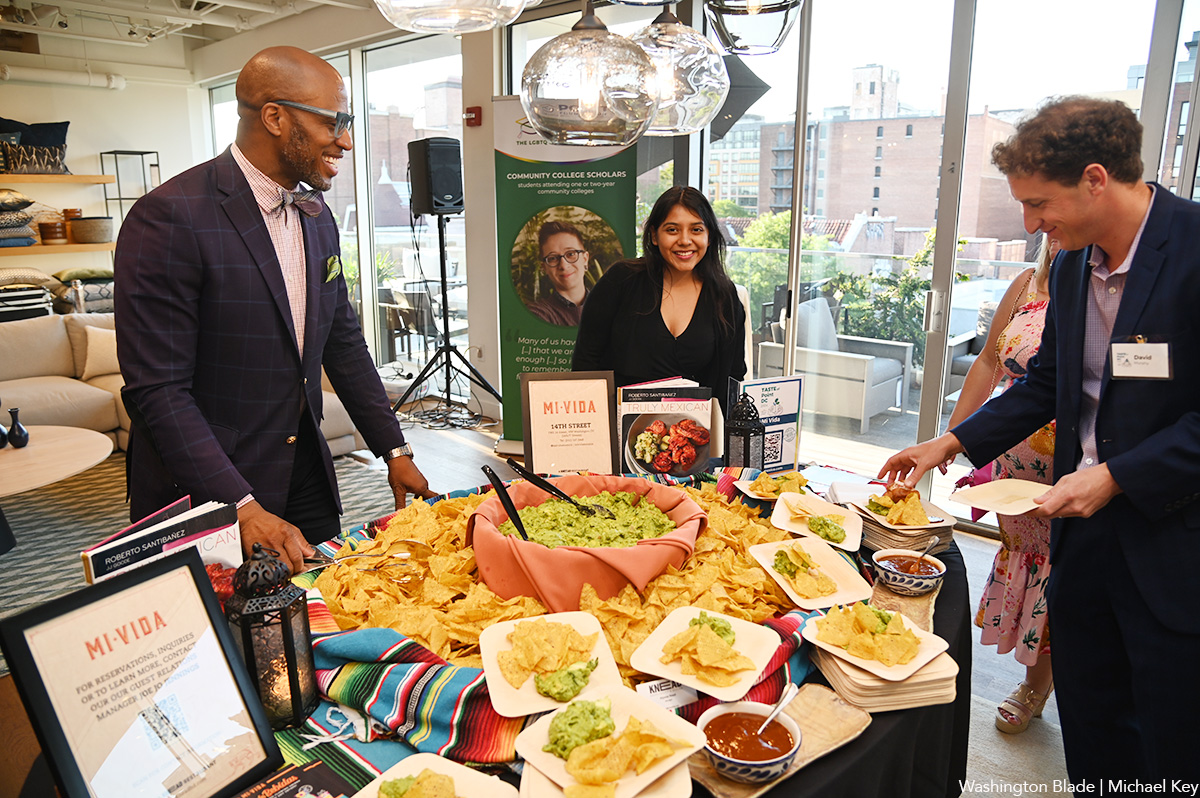
Point Foundation will host its annual “Taste of Point Reception” on Wednesday, May 7 at 6:30 p.m. at Room & Board.
The popular event will take place on the top floor and outdoor terrace at Room & Board, featuring small plates from area restaurants, hand-crafted cocktails from local mixologists, and a speaking portion where guests will hear directly from Point Foundation scholars. This year, Point is supporting a record-breaking class of 755 scholars and guests’ support will allow Point to continue its mission. Point Foundation is the nation’s largest scholarship-granting organization for LGBTQ students of merit.
Tickets are tax deductible and can be purchased at Point’s website.
-

 Federal Government4 days ago
Federal Government4 days agoHHS to retire 988 crisis lifeline for LGBTQ youth
-

 Opinions4 days ago
Opinions4 days agoDavid Hogg’s arrogant, self-indulgent stunt
-

 District of Columbia4 days ago
District of Columbia4 days agoD.C. police seek help in identifying suspect in anti-gay threats case
-

 Virginia4 days ago
Virginia4 days agoGay talk show host wins GOP nom for Va. lieutenant guv

